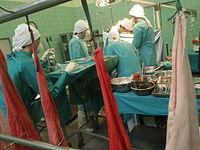
Photo from wikipedia
BACKGROUND Temporary mechanical circulatory support (MCS) devices are generally used short term to maintain adequate organ perfusion in patients with advanced heart failure and cardiogenic shock. Unacceptably high waitlist mortality… Click to show full abstract
BACKGROUND Temporary mechanical circulatory support (MCS) devices are generally used short term to maintain adequate organ perfusion in patients with advanced heart failure and cardiogenic shock. Unacceptably high waitlist mortality in this cohort motivated changes to heart allocation policy, which recognized the severity of illness by prioritization for temporary MCS and broader sharing in the new U.S. donor heart allocation policy. We evaluated the post-heart transplant outcomes for patients bridged with temporary MCS, a control population not bridged with MCS, and a cohort bridged with durable MCS. METHODS The heart transplant research database was queried to identify patients bridged with temporary MCS and bridged with durable MCS who went directly to heart transplant in our center. Temporary MCS included Impella, intra-aortic balloon pump, and extracorporeal membrane oxygenation. Post-transplant endpoints were assessed at 30 days, 6 months, and 1 year. RESULTS From 2010 to 2017, a total of 23 patients were bridged to heart transplant with temporary MCS and 548 were transplanted without MCS bridge. Patients bridged with temporary MCS had younger age, lower body mass index, and higher frequencies of prior blood transfusion and Status 1 (1A/1B) listing at transplant compared to patients not bridged with MCS (all P < .001). Despite the severity of illness in patients bridged with temporary MCS, post-transplant outcomes were indistinguishable from those in patients transplanted without MCS bridge, with no difference in 30-day, 6-month, or 1-year survival or 1-year freedom from cardiac allograft vasculopathy, nonfatal major adverse cardiac events, any-treated rejection, acute cellular rejection, or antibody-mediated rejection (P = .23-.97). Similarly, compared to 157 patients bridged with durable MCS, no differences in post-transplant outcomes were identified for the temporary MCS cohort (P = .15-.94). CONCLUSION Temporary MCS as a bridge to transplant achieves similar post-transplant outcomes at 1 year compared to no MCS and durable MCS. These encouraging findings support recent changes in the Organ Procurement and Transplantation Network | United Network Organ Sharing (OPTN|UNOS) adult heart allocation policy.
Journal Title: Transplantation proceedings
Year Published: 2020
Link to full text (if available)
Share on Social Media: Sign Up to like & get
recommendations!